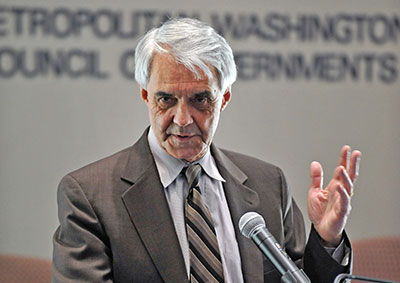Over the years, in countless newspaper articles, radio and TV interviews, feature stories in magazines, and even online chats, Ron Kirby graciously shared with the media and the public his vast knowledge about transportation, accumulated over several decades of study and work.
When reporters wanted to write a story about the region's biggest transportation projects or the most challenging traffic woes facing area travelers, they knew to come to Ron Kirby. Ron was both willing and able to talk about anything from traffic and tolls to Metro and land-use.

Earlier in 2013, when Virginia and Maryland each passed legislation to raise new revenue for transportation -- the first time either had done so in more than 20 years -- The Washington Post turned to Ron for his insight.
"Can we be smart about spending the D.C. region's new transportation money?," the article asked.
Ron didn't take sides, instead advocating a multimodal approach. Robert Thomson, better known as The Post's Dr. Gridlock, wrote, "Ron Kirby grows impatient with any attempt to pick a single solution, or battling about one mode over another. 'Get off the modal war,' [Kirby] said. 'Have all modes work together.'"
Beyond a multimodal approach to transportation, Ron also saw land-use and, more controversially, tolling as keys to the region's transportation future. In a 2011 Washingtonian article that asked "Can Washington handle 30 more years of terrible traffic?," Ron weighed in on both of these subjects.
"Building without restraint of use is hopeless," Kirby told the reporter. "Instead of four lanes of gridlock, you end up with six."
Concentrating more housing and job growth near transit could help reduce demand, Ron explained. But, he said, it's not a silver bullet. "Eighty-five percent of what will be on the ground in 2040 is already there or approved," Ron told Washingtonian. "Only 15 percent can change."
So what's the region to do? "That's the sort of question a transportation planner like Kirby lives to answer," wrote the reporter. "'Yes, there is a way,' he said, with the aura of a traffic Yoda. 'It would be a paradigm shift, but you could actually resolve this problem if you could price every roadway across the region.'"
Ron's transportation expertise extended to understanding travel patterns in the region better than just about anyone else. In 2013, Kojo Nnamdi, a radio host at WAMU, asked Ron to join a conversation about how travel behavior in the region was changing -- in particular, evidence that driving in the area was actually on the decline.
Nnamdi went straight to Ron for the hard data.
"Between 2005 and 2011, we had an increase of 350,000 people in the region, just over 7 percent," Ron told listeners. "But the total vehicle-miles of travel stayed flat over that period, 110 million miles per day. The result: vehicle-miles of travel per capita has declined by about 6 percent."
The panelists proffered explanations for the decline. Some said that young people were contributing most to the decline. Ron added that electronic communications had made a big difference. And, he said, citing more data, "Telecommuting has increased dramatically in this region -- 27% of people in 2013. Ten years ago it was 13%."
One of the things Ron saw as most urgent for the region was the proper maintenance of Metro and efforts to get as much out of the existing system as possible, sometimes through less-than-obvious ways.
"Getting Metro back into good operating shape is probably the single most important thing for us to be doing," Ron told The Washington Post in October 2013. "Everybody, I think, realizes that we have such an investment in this system that we have to be prepared to have it up and operating efficiently."
And, responding to a question about how to deal with increased overcrowding of the system, Ron said that "some of the solutions to the overcrowding don’t require changes to the Metro system, but to the way the region's land is used."
"A lot of what we need to do with the Metrorail challenges is shape the demand," Ron told The Post. That could be done either by encouraging more "reverse-commute" trips -- by locating job centers near suburban Metro stations -- or by "selling the same seat twice," as he liked to say -- by building more mixed-use neighborhoods near closer-in stations.
In his 26 years as director of transportation planning at the TPB, Ron Kirby saw more happen on transportation in the Washington region than most. His decades of experience in the field, including his time before coming to the TPB, made him one of the most knowledgeable transportation professionals in the region. And his willingness and ability to share his insights with others made him one of the most influential.
Related Links